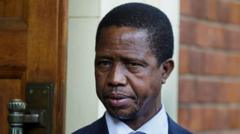Amid mourning for military and nuclear experts killed during recent hostilities with Israel, Iran holds a significant state funeral in Tehran.
Iran commences State Funeral for War Victims, including Military Leaders

Iran commences State Funeral for War Victims, including Military Leaders
Thousands in Tehran pay tribute to military and nuclear figures lost in conflict with Israel.
Thousands of mourners gathered in the streets of Tehran on Saturday for a state funeral honoring approximately 60 individuals who lost their lives in the recent conflict with Israel, among them key military leaders and nuclear scientists. Iranian state television provided live coverage, showing a stark contrast to the previously deserted streets that had been a backdrop to the 12-day war. Participants waved the national colors of Iran—green, red, and white—alongside red banners inscribed with religious slogans and branches of white flowers.
As the funeral procession progressed, traditional chants echoed throughout the streets, with slogans such as "Death to America" and "Death to Israel" resounding as military trucks transporting caskets moved slowly between two prominent squares in Tehran. Following this procession, the caskets were set for burial at various cemetery sites, with some expected to be interred alongside family members.
Iran's leadership was minimally visible during this somber occasion, with Supreme Leader Ayatollah Ali Khamenei absent, but President Masoud Pezeshkian participated in the march. This funeral served as a poignant reminder of the significant losses endured by Iran, both in terms of military personnel and critical figures linked to its contentious nuclear endeavors. Reports indicated that of the over 600 fatalities attributed to Israeli airstrikes, around 90 were military members, including at least 11 notable nuclear scientists.
Each casket, shielded by a clear wrap adorned with the Iranian flag, was decorated with rose petals. In a particularly heartbreaking gesture, one truck was reported to carry the caskets of children. Mourners reached out to touch or kiss the coffins as they passed, displaying deep reverence for those who had fallen.





















